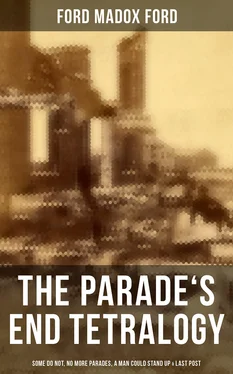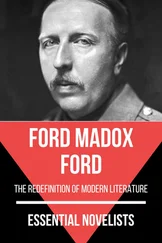At a word from Sir Reginald, Macmaster, on the other hand, would murmur: ‘You’re very good, Sir Reginald!’ and Tietjens thought that perfectly proper.
Macmaster was a little the senior in the service, as he was probably a little the senior in age. For, as to his roommate’s years, or as to his exact origins, there was a certain blank in Tietjens’ knowledge. Macmaster was obviously Scotch by birth, and you accepted him as what was called a son of the manse. No doubt he was really the son of a grocer in Cupar or a railway porter in Edinburgh. It does not matter with the Scotch, and as he was very properly reticent as to his ancestry, having accepted him, you didn’t, even mentally, make enquiries.
Tietjens always had accepted Macmaster—at Clifton, at Cambridge, in Chancery Lane and in their rooms at Gray’s Inn. So for Macmaster he had a very deep affection—even a gratitude. And Macmaster might be considered as returning these feelings. Certainly he had always done his best to be of service to Tietjens. Already at the Treasury and attached as private secretary to Sir Reginald Ingleby, whilst Tietjens was still at Cambridge, Macmaster had brought to the notice of Sir Reginald Tietjens’ many great natural gifts, and Sir Reginald, being on the look-out for young men for his ewe lamb, his newly founded department, had very readily accepted Tietjens as his third in command. On the other hand, it had been Tietjens’ father who had recommended Macmaster to the notice of Sir Thomas Block at the Treasury itself. And, indeed, the Tietjens family had provided a little money—that was Tietjens’ mother really—to get Macmaster through Cambridge and install him in Town. He had repaid the small sum—paying it partly by finding room in his chambers for Tietjens when in turn he came to Town.
With a Scots young man such a position had been perfectly possible. Tietjens had been able to go to his fair, ample, saintly mother in her morning-room and say:
‘Look here, mother, that fellow Macmaster! He’ll need a little money to get through the University,’ and his mother would answer:
‘Yes, my dear. How much?’
With an English young man of the lower orders that would have left a sense of class obligation. With Macmaster it just didn’t.
During Tietjens’ late trouble—for four months before Tietjens’ wife had left him to go abroad with another man—Macmaster had filled a place that no other mart could have filled. For the basis of Christopher Tietjens’ emotional existence was a complete taciturnity—at any rate as to his emotions. As Tietjens saw the world, you didn’t ‘talk.’ Perhaps you didn’t even think about how you felt.
And, indeed, his wife’s flight had left him almost completely without emotions that he could realize, and he had not spoken more than twenty words at most about the event. Those had been mostly to his father, who, very tall, very largely built, silver-haired and erect, had drifted, as it were, into Macmaster’s drawing-room in Gray’s Inn, and after five minutes of silence had said:
‘You will divorce?’
Christopher had answered:
‘No! No one but a blackguard would ever submit a woman to the ordeal of divorce.’
Mr Tietjens had suggested that, and after an interval had asked:
‘You will permit her to divorce you?’
He had answered:
‘If she wishes it. There’s the child to be considered.’ Mr Tietjens said:
‘You will get her settlement transferred to the child?’ Christopher answered:
‘If it can be done without friction.’
Mr Tietjens had commented only:
‘Ah!’ Some minutes later he had said:
‘Your mother’s very well.’ Then: ‘That motor-plough didn’t answer,’ and then: ‘I shall be dining at the club.’ Christopher said:
‘May I bring Macmaster in, sir? You said you would put him up.’
Mr Tietjens answered:
‘Yes, do. Old General ffolliot will be there. He’ll second him. He’d better make his acquaintance.’ He had gone away.
Tietjens considered that his relationship with his father was an almost perfect one. They were like two men in the club—the only club; thinking so alike that there was no need to talk. His father had spent a great deal of time abroad before succeeding to the estate. When, over the moors, he went into the industrial town that he owned, he drove always in a coach-and-four. Tobacco smoke had never been known inside Groby Hall: Mr Tietjens had twelve pipes filled every morning by his head gardener and placed in rose bushes down the drive. These he smoked during the day. He farmed a good deal of his own land; had sat for Holdernesse from 1876 to 1881, and had not presented himself for election after the redistribution of seats; he was patron of eleven livings; rode to hounds every now and then, and shot fairly regularly. He had three other sons and two daughters, and was now sixty-one.
To his sister Effie, on the day after his wife’s elopement, Christopher had said over the telephone:
‘Will you take Tommie for an indefinite period? Mar-chant will come with him. She offers to take charge of your two youngest as well, so you’ll save a maid, and I’ll pay their board and a bit over.’
The voice of his sister—from Yorkshire—had answered: ‘Certainly, Christopher.’ She was the wife of a vicar, near Groby, and she had several children.
To Macmaster Tietjens had said:
‘Sylvia has left me with that fellow Perowne.’ Macmaster had answered only: ‘Ah!’
Tietjens had continued:
‘I’m letting the house and warehousing the furniture. Tommie is going to my sister Effie. Marchant is going with him.’
Macmaster had said:
‘Then you’ll be wanting your old rooms.’ Macmaster occupied a very large storey of the Gray’s Inn buildings. After Tietjens had left him on his marriage he had continued to enjoy solitude, except that his man had moved down from the attic to the bedroom formerly occupied by Tietjens.
Tietjens said:
‘I’ll come in to-morrow night if I may. That will give Ferens time to get back into his attic.’
That morning, at breakfast, four months having passed, Tietjens had received a letter from his wife. She asked, without any contrition at all, to be taken back. She was fed-up with Perowne and Brittany.
Tietjens looked up at Macmaster. Macmaster was already half out of his chair, looking at him with enlarged, steel-blue eyes, his beard quivering. By the time Tietjens spoke Macmaster had his hand on the neck of the cut-glass brandy decanter in the brown wood tantalus.
Tietjens said:
‘Sylvia asks me to take her back.’
Macmaster said:
‘Have a little of this!’
Tietjens was about to say: ‘No,’ automatically. He changed that to:
‘Yes. Perhaps. A liqueur glass.’
He noticed that the lip of the decanter agitated, tinkling on the glass. Macmaster must be trembling. Macmaster, with his back still turned, said:
‘Shall you take her back?’
Tietjens answered:
Читать дальше












